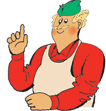Subscription
Dual product control legitimized norms of the Customs Union

Soon all finished products of animal origin in Russia will be checked not only in the Federal Service, but in the Rosselkhoznadzor.
The decision to expand the powers of the veterinary authorities in the framework of the Customs Union (CU) has approved Council of the Eurasian Economic Commission for Europe (ECE). Their additional losses from the dual control manufacturers is estimated at 5 billion rubles. per year.
The fact that the ECE Board approved amendments to the technical regulations that expand the powers of the veterinary authorities, including the inspection of finished products, told the participants of the market. Source of "Y" in the Commission confirmed that the proposal approved by the representatives of the three countries (Russia, Belarus, Kazakhstan), adding that a final decision on the issue can be expected in September. "The meeting was held at the level of deputy prime ministers of the three countries, all of them, including representing Russia Igor Shuvalov, who reacted favorably to this initiative", - assured one of those present at a meeting of businessmen.
need to introduce the measure in the National Meat Association and the Union Fish explained gap left in the legislation as a result of Russia's accession to the WTO. According to the rules of that organization if Russia does not carry vetsertifikatsiyu finished goods in the country, it can not demand it from foreign suppliers. Thus, the import finished products of animal origin fall out from under the control of a border crossing Russia and the Customs Union. According to current regulations, and to examine such products can only be on store shelves. According to customs statistics, in the Russian Federation imported food by $ 40 billion a year.
solving the problem of the verification of imported food, the TC provides a platform for over-regulation in the country. In 2009, in order to eliminate duplicate functions Rosselkhoznadzor Epidemiology and verification of products was accepted by the government, separate the functions of the two agencies. Thus, the object of Veterinary Surveillance recognized raw food of animal origin to the implementation of industrial processing and finished products fell under the jurisdiction of the sanitary authority.
with changes in legislation TC (higher priority supranational) power to review the finished product is obtained as a veterinary authorities of subjects of the Russian Federation (subordinate governors) and in the face of federal Rosselkhoznadzor. According to the manufacturers, it will increase their costs of registration veterinary certificates for at least 5 billion Rubles year. Its current annual cost of veterinary documents required for crossing the border, including the regions, the market is estimated at 9.5 billion rubles. "One gets the impression that the business plan to starve," - noted in the advisory council on the development of commercial activities in the Ministry of Industry. According to experts, in a single list of goods subject to vetkontrolyu, gets almost all of the nomenclature, including flour products containing animal proteins.
solution to the problem in the Fishery Union see in the speedy implementation of the system of electronic certification that will not charge you and take administrative pressure from retailers and manufacturers. The head of the Russian Grain Union Arkady Zlochevsky sure that the most appropriate output will decline in excess of the legal regulation of business and focus on the elimination of the state of holes in standardization and administration of customs policy. "Because of them, our country duty-free imported goods worth three times more than the volume of legal imports of food," - says the expert.




